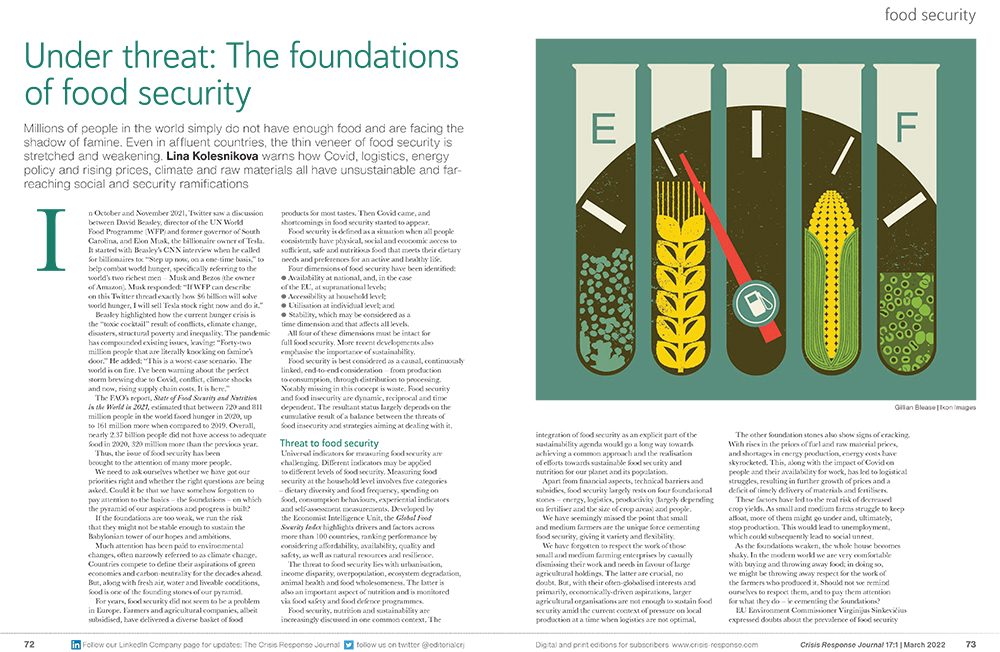Major blow to food security
The war in Ukraine has dealt a major blow to global food security through its impacts on wheat, oil and fertiliser exports, in a world already reeling from Covid-19 and climate change, experts told SciDevNet.
Friederike Greb, an economist with the World Food Programme, told SciDev.Net readers at a conference call on Tuesday that the role of Russia and Ukraine in global grain and energy markets meant there would be “huge collateral damage on food security” from the conflict.
Russia and Ukraine together account for about 30 per cent of global wheat exports, 20 per cent of maize, and almost 80 per cent of sunflower oil. The Food and Agriculture Organization (FAO) has warned that the crisis could lead to between eight and 13 million more people being undernourished next year. While a lot of exports have already happened for the current marketing year, there’s still almost 40 million tonnes of wheat and 60 million tonnes of maize basically frozen in Russia and Ukraine, Greb warned at the monthly online event.

The Crisis Response Journal also looks at food security in its latest edition – 17:1 – published in March 2022, with an article by Lina Kolesnikova. Click here to find out how to subscribe (logged in subscribers already have full access to the article). Main image and thumb: Ikon Images
Global wheat prices soared in the two weeks after the Russian military invasion on 24 February. It came as the FAO's Food Price Index, a benchmark gauge for world food prices, reached an all-time high last month.
"Of course, if I buy bread I don’t pay the global wheat price", explained Greb. “It then has to trickle down to local consumer markets to actually have an effect on food security in poor countries." That is expected to happen first in import-dependent countries and that’s when you get this food security effect, when people lose access to food because the price of the food that they buy in their local market goes up.
Greb said the prices rises were particularly concerning for the Middle East, a big importer of wheat from Ukraine. Lebanon imports more than 50 per cent of its wheat from the country, Yemen 22 per cent, and Tunisia 42 per cent, she said, adding that price rises would be felt by all wheat-importing countries, not only those buying directly from Ukraine.
Aladdin Hamwieh, a biotechnologist and Egypt country manager for the International Center for Agricultural Research in the Dry Areas (ICARDA), said the Middle East was already seeing such price rises hitting consumers. “Two days ago, I went to buy bread and [the price increase] was 25 per cent," he said.
There are also concerns about the impact on imports of potassium chloride, used in fertilisers, from Ukraine and Russia, said Hamwieh, which could further derail food production.
He said the region was already suffering from the effects of severe dry climates and other global shocks. “Our crops really suffered to survive this year in Morocco… The crisis of Ukraine and Russia came at a very hard time after COVID-19 and the new development of climate change,” Hamwieh noted.
There is great potential in research and development for climate resilient wheat varieties in order to reduce reliance on Ukraine and Russia, according to Hamwieh, but he says increased government investment is needed to support it.
Fermin D Adriano, undersecretary for policy and planning at the department of agriculture in the Philippines, said the crisis was also exacerbating problems in the Asia Pacific region, where more than 35 million people fell below the poverty line during the pandemic, according to the World Bank. “We already had a problem in terms of accessing food because of the logistical bottlenecks that came about because of COVID-19,” he explained.
“This [conflict in Ukraine] compounds the problem because of the fact that the two countries are major producers of wheat and corn,” which are used in the region for human and animal consumption, Adriano continued.
Rising fuel prices as a result of the war are also driving up fertiliser prices as large amounts of natural gas are needed to produce ammonia, the key ingredient in nitrogen fertiliser. “In the Philippines fertiliser prices have actually tripled and that will have implications on the productivity of our farmers,” Adriano said, adding that a million metric tonnes of rice could be lost as a result.
Greb believes the effects on food security will be felt most acutely in poor countries. “When you look at the most vulnerable, they spend a huge share of their income on food… Even if it’s a small increase in the local price, it can really have an effect on the affordability of food for the poor,” she said.
The rise in the price of oil, which reached a 14-year high in the past week as a result of the conflict, will also affect the food crisis, according to Greb, as transportation and production costs rise and drive up inflation.
She said the World Food Programme expected its own procurement costs for food commodities and fuel to go up by US$29 million a month at current price levels. “Those come on top of all the price increases that we’ve already seen in the past year-and-a-half or so,” she said, adding that many poor countries were still struggling to recover from the impacts of the two-year long Covid-19 pandemic.
“It comes at a point when really the world is not in need of another crisis,” she added.
-
This piece was produced by SciDev.Net’s Global desk, authored by Ruth Douglas and reproduced under Creative Commons 2.0. Read the original article here